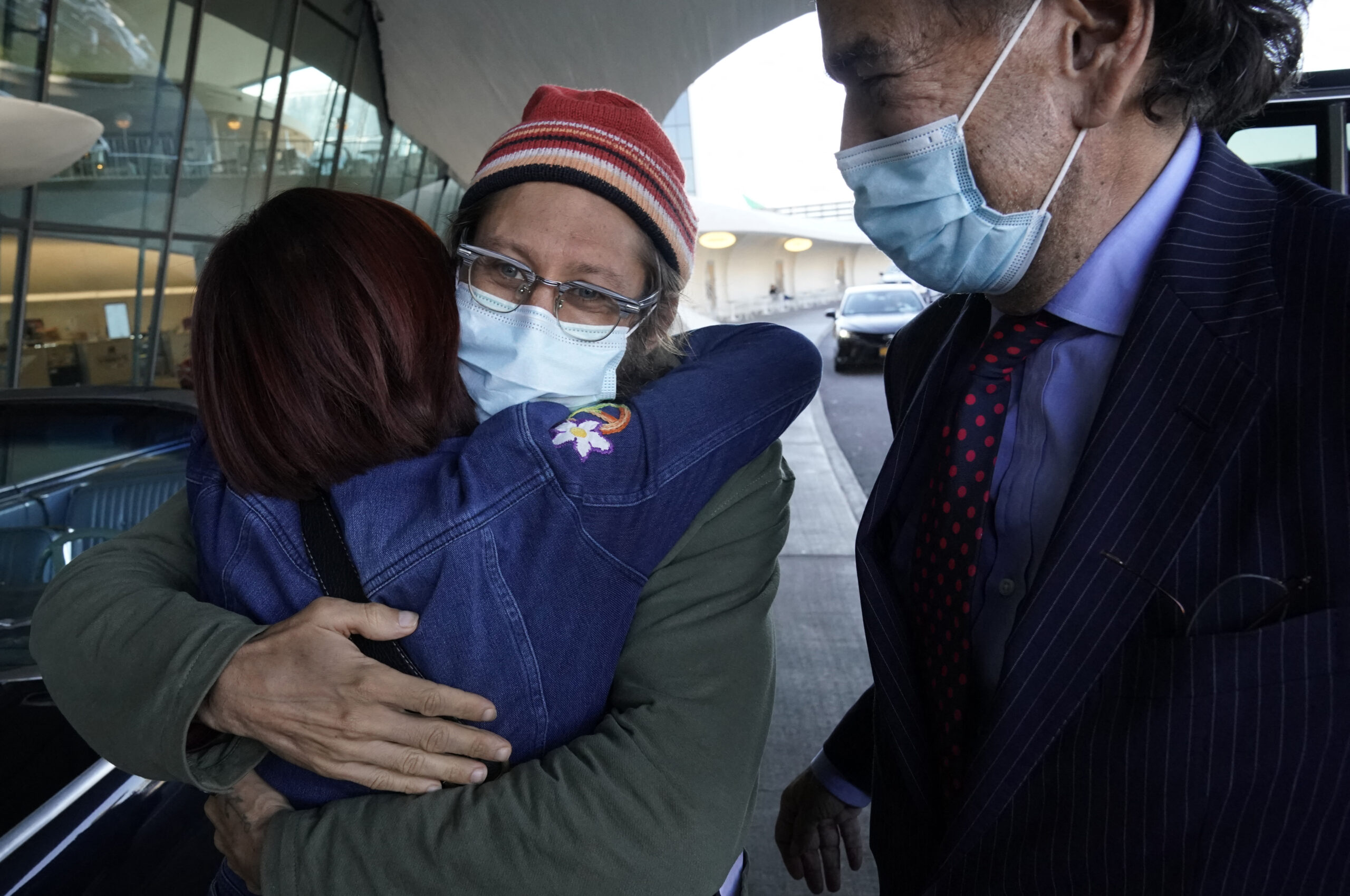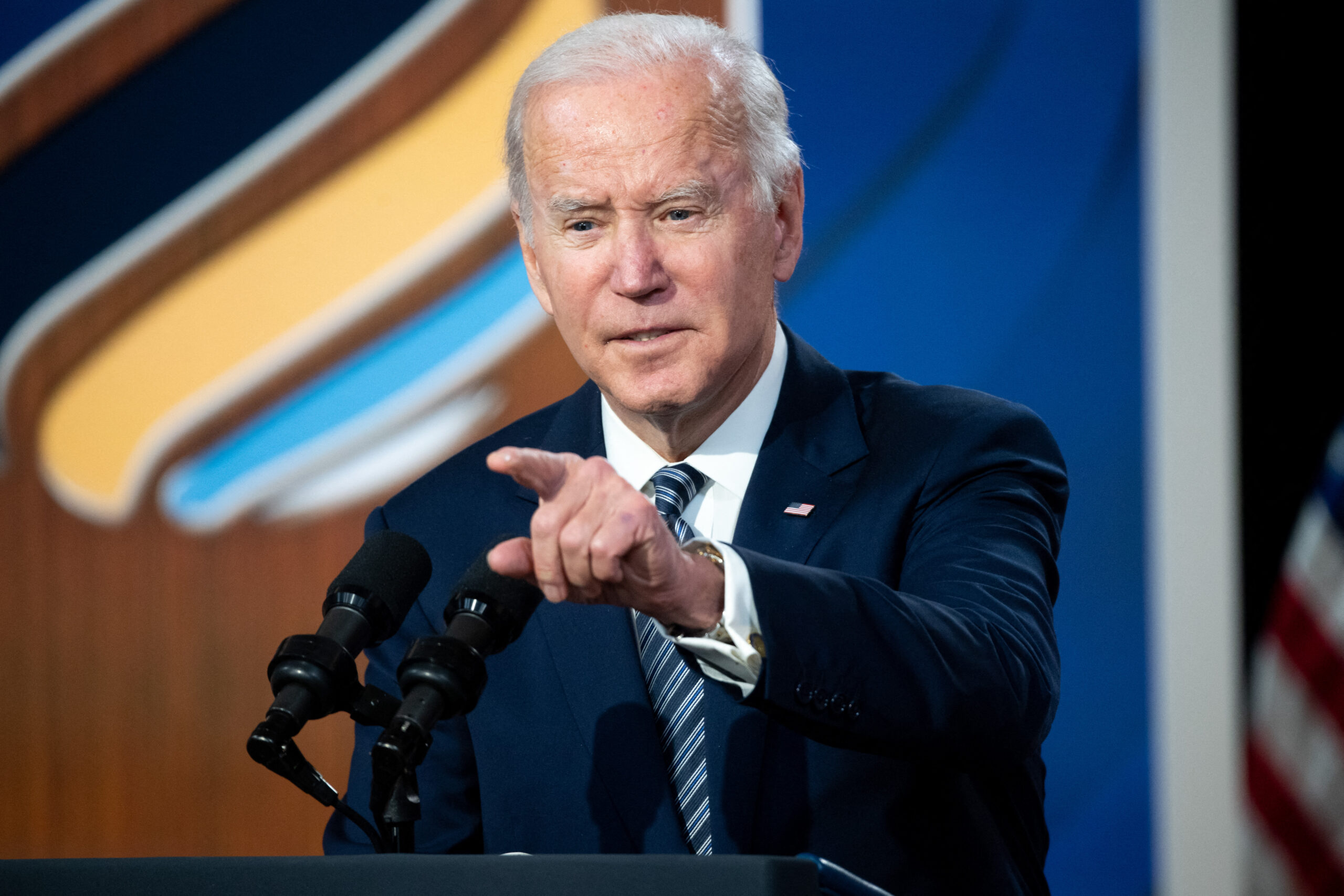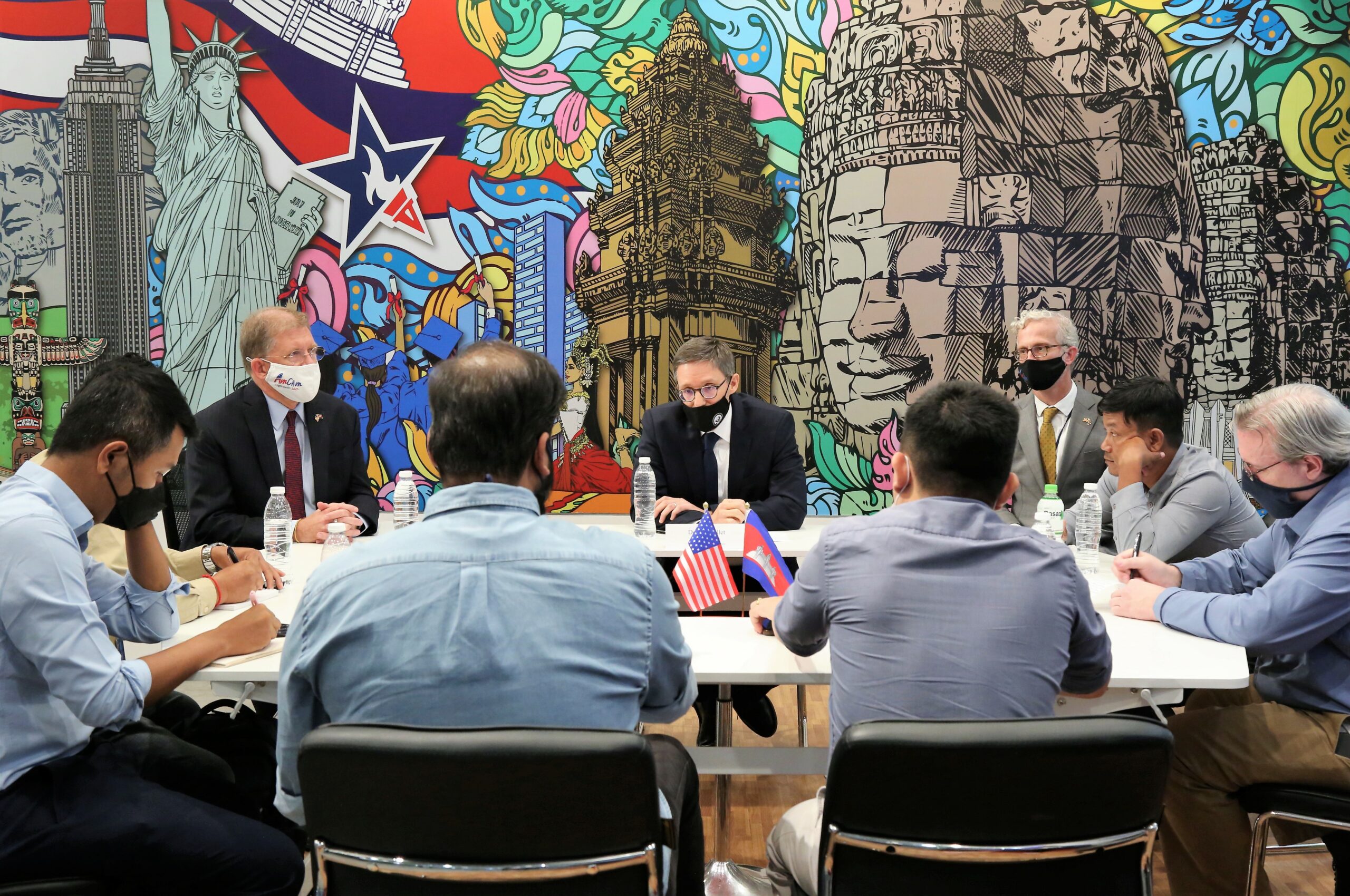A senior US diplomat visiting Cambodia during a trip through Southeast Asia addressed ongoing political repression and human rights abuses in Myanmar, but also focused on the strategic and economic importance the US places on engagement with other nations in the region.
As Cambodia prepares to take the revolving chair of the Association of Southeast Asian Nations (ASEAN) in 2022, US Department of State counselor Derek Chollet discussed attempts to strengthen ties with Southeast Asia.
Chollet briefed journalists in Phnom Penh on 10 December concerning discussions he had earlier in the day with members of Cambodian prime minister Hun Sen’s government. Topics included tensions between the US and Cambodia over the Kingdom’s relationship with China and the need for ASEAN countries to continue pressing Myanmar’s military junta to ease its authoritarian crackdown on civilians and dissidents since seizing power in a 1 February coup.
“We are at a diplomatic impasse with Myanmar, unfortunately, the result of which seems to be greater suffering of the people,” said Chollet, seated alongside US ambassador to Cambodia W. Patrick Murphy in the AmCam Exchange office.
Engagement with Myanmar needs to be “purposeful,” said Chollet, a senior adviser to secretary of state Antony Blinken. “It needs to be one that leads to an inclusive process. It needs to be one that leads to greater humanitarian access and a reduction of violence.”
ASEAN members agreed to a ‘Five Point Consensus’ in April calling for an “immediate cessation” of violence in Myanmar, constructive dialogue among concerned parties, a mediation meeting with the association chair as a special envoy with assistance from the organisation’s secretary-general, humanitarian aid from member nations through the ASEAN Coordinating Centre for Humanitarian Assistance and a delegation visit to Myanmar to meet concerned parties.
Chollet noted ASEAN’s combined effort toward Myanmar has been possibly the most significant accomplishment since the coup and stressed the US message to Cambodian leadership was to focus efforts as ASEAN chair “in the service of upholding and strengthening” the Five Point Consensus.
“ASEAN has really stepped up in a significant way and that’s something the US strongly supports, as we believe in ASEAN centrality,” said Chollet, who called the Five Point Consensus a “critically important” initiative on which the US plans to work with the association to uphold.
The military regime’s power grab was ostensibly prompted by unproven claims of electoral fraud by the incoming civilian National Unity Government led by Aung San Suu Kyi, who was convicted on 6 December of incitement and Covid-19 restriction violations and sentenced to four years in prison, commuted to two years.
Additional charges potentially compounding to life imprisonment still hang over Suu Kyi, who became an opposition symbol during 15 years of house arrest, although her reputation took a beating when she appeared to excuse abuses against the country’s predominantly Muslim Rohingya ethnic group.
ASEAN member states are expected to play a crucial role in ending or at least reducing the number of human rights abuses by the junta, including the extrajudicial killings of civilians.
Social media posts on 7 December purported to show the aftermath of an attack in which government soldiers captured and burned alive 11 men in a rural village. In another fatal crackdown, witnesses said a military vehicle struck and killed protesters on 5 December in Yangon, the nation’s largest city, while troops also reportedly fired shots into a crowd. The death toll since the coup is estimated to be above 1,300.
Among the grassroots protests organised as part of a muted but persistent civil unrest movement, a national ‘silent strike’ took place across Myanmar on 10 December. Many business operators stayed at home while protesters wore black, displayed anti-government signs and raised three-finger resistance salutes in online posts.
The junta’s leader, senior general Min Aung Hlaing, was pointedly uninvited to ASEAN’s virtual summit in October over differences with the other nine members, including the military government’s failure to meet the Five Point Consensus conditions or allow an ASEAN representative to visit Suu Kyi in detention.
Bill Richardson, a former US governor and ambassador to the United Nations, traveled to Myanmar in November and helped secure the release of US journalist Danny Fenster, who was imprisoned by the junta for five months. The managing editor of online news magazine Frontier Myanmar had been sentenced to 11 years for associating with government opponents, spreading information harmful to the military and violating immigration laws.

Chollet stressed the need for ASEAN nations to press the regime’s leaders to improve the humanitarian and political situation inside the besieged country.
“The US is not against engagement for engagement’s sake. We still have an embassy in Myanmar. But we’re quite clear that the engagement needs to have purpose. It can’t come for free and we want to see genuine progress on the ground,” Chollet said, noting that diplomacy by Brunei as the sitting ASEAN chair since the junta’s takeover was energetic but ultimately unsuccessful.
We’re quite clear that the engagement needs to have purpose. It can’t come for free
Derek Chollet, US Department of State counselor
“We would expect of any engagement forthcoming that it actually brings results and it’s not just something that is a concession to the junta that is unwarranted in our view,” Chollet said.
Yet Hun Sen has already undermined the effort even before Cambodia begins its 2022 chairmanship. The prime minister, known for bludgeoning opposition while retaining an unyielding grip on power since 1985, met with junta foreign minister Wunna Maung Lwin on 7 December in Phnom Penh and called for the regime’s inclusion in ASEAN meetings next year.
He also accepted an invitation from Wunna Maung Lwin to visit Myanmar.
“If I don’t work with current leaders, then with whom should I be working,” Hun Sen said during the meeting that included the two men doing a pandemic elbow bump for cameras at the prime minister’s Phnom Penh office building, known as Peace Palace.
Chollet addressed recent US sanctions against Cambodia and individual military officials over the Kingdom’s relationship with the People’s Republic of China (PRC), although he did not discuss specifics of reported tensions between the US and Cambodia related to Chinese funds being used to revamp Cambodia’s Ream Naval Base on the Gulf of Thailand. Increased Chinese military access to the Cambodian southern coast undoubtedly fuels US disquiet over China’s attempts to increase its dominance over the adjacent South China Sea.
The diplomat said the US is “very concerned” about discussions between Cambodia and China and has registered those views with Hun Sen’s government, not just during Chollet’s visit but over the past several years.
“We haven’t seen the kind of progress we would like to see, which is why the United States has announced several measures in response to make clear that we think that there’s a threat, not just to our interests, but to the region and also, we would say, to Cambodian interests if there’s a deeper PRC-Cambodia military relationship,” Chollet said.
The US state department placed a largely symbolic arms embargo on Cambodia beginning 8 December, citing concerns about the growing influence of China’s military in the Kingdom, while the US commerce department noted Chinese human rights abuses in an announcement of restrictions on defense exports to Cambodia.
The US also issued specific sanctions in November against Cambodian general Chau Phirun, director-general of the defense ministry’s material and technical services department, and admiral Tea Vinh for alleged corruption linked to work at the Ream naval base.
Chollet’s comments on China echoed Daniel Kritenbrink, the US assistant secretary of state for East Asian and Pacific Affairs, who swung through the region in late November and early December with stops in Indonesia, Malaysia, Singapore and Thailand. In Bangkok, Reuters reported Kritenbrink said there was no appeal made to Asian countries to choose between China and the US.
“We do want partners in the region to have choices, however. And specifically to have the sovereign say over all of their own decisions,” Kritenbrink said.
As Chollet arrived in Cambodia, US President Joe Biden held a two-day, virtual Summit for Democracy with more than 100 global leaders to discuss factors impeding global democracy including corruption, attacks on press freedom and the use of technology to stifle democratic dissent. The summit concluded on 10 December with Biden announcing plans to spend up to $424 million worldwide over the next year to support democracy initiatives.

Chollet stressed there will be “probably even more focus next year on Southeast Asia from the US perspective” because of Cambodia’s ASEAN chairmanship and Indonesia’s presidency of the Group of 20, during which Jakarta will be the region’s sole representative in the powerful collective of government finance bodies.
Chollet’s visit to Cambodia preceded his appearance in Indonesia with secretary of state Blinken, who was also scheduled to visit Malaysia and Thailand. Before joining Chollet in the region, Blinken met with ASEAN foreign ministers during a Group of 7 summit in Liverpool, England.
Blinken previously held a virtual meeting with ASEAN officials in August, the same month US vice president Kamala Harris traveled to Singapore and Vietnam. The top US military official, defense secretary Lloyd Austin, visited the Philippines, Vietnam and Singapore in July, while deputy secretary of state Wendy Sherman met with Hun Sen in June.
In his meetings with officials in Phnom Penh including deputy prime minister Prak Sokhonn, Chollet said he found agreement between US interests and Cambodia’s ambitions for the ASEAN chairmanship on issues including pandemic recovery, climate change and empowering women.
Beyond social and environmental concerns, Chollet said economics is a primary driver of US interest in the region.
“One of the reasons the Biden administration has been so keen to engage intensively in Southeast Asia is because of the huge economic importance it already has and the potential it has to even get deeper,” Chollet said, noting the US has an “underdeveloped economic relationship” with nations in the region and needs to progress further in strengthening the connection.
He said Singapore is a “significant partner” in business, which is the reason Harris and other US officials, including Chollet, have visited the city-state since Biden took office less than a year ago. He said Singapore is already an “important player” and agreed with the suggestion that the nation could become more so if continuing tensions with China drive Western investment away from Hong Kong.
“I’m not sure how the Hong Kong story is going to play out in the coming years, but there’s no question that that’s going to change the economic picture of this region and that other countries, I think, can fill that void perhaps if Hong Kong does in fact constrict as an economic player,” Chollet said.
Business opportunity linked to the fortunes of Hong Kong is only a single facet of the economic interest the US has in the region, Chollet said.
Unintentionally underpinning the business message, Chollet and ambassador Murphy sat with a group of reporters around a table in the AmCam Exchange storefront office next to a Hard Rock Cafe at the Exchange Square shopping mall, chosen for its convenient location adjacent to the US embassy.
Chollet noted other examples of US and Southeast Asian economic dialogue, including a trip by secretary of commerce Gina Raimondo to Singapore and Malaysia in November and a possible regional visit early next year by US trade representative Katherine Tai.
“All of the conversations we have with our friends in this part of the world, economics is first and foremost,” Chollet said.



